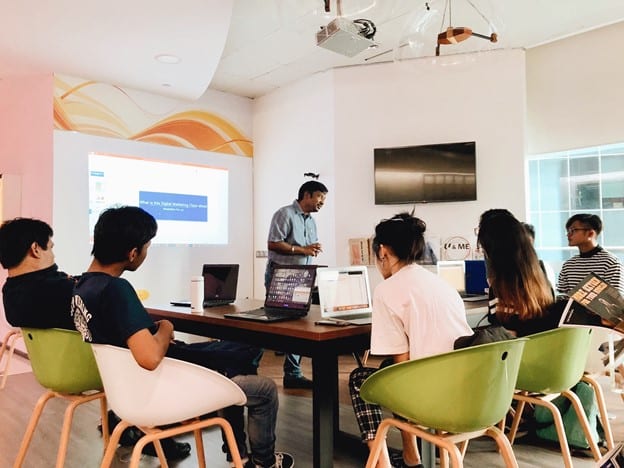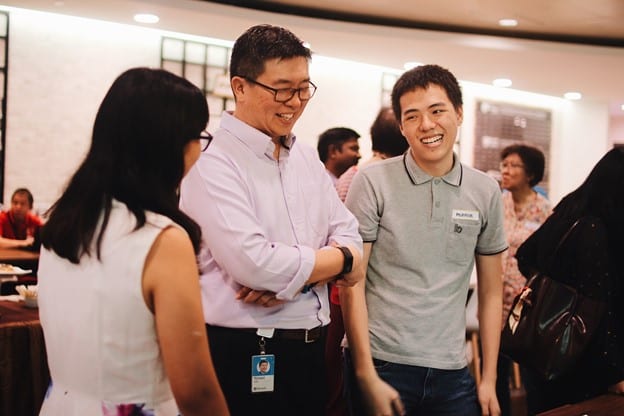Changing career paths can be intimidating, especially in these uncertain economic times. Switching to an entirely new role or industry requires skills and support, not to mention confidence and courage.
The constant need to apply, upskill, go for interviews—the list goes on and on—can leave you absolutely jaded.
Hatch, a Singapore-based social enterprise, wants to change that.
Founded in 2018, Hatch aims to help individuals upskill and become more employable through training and job-matching. To date, they have trained 78 students through their Immersive and Accelerator programmes across two tracks: Digital Marketing and User Interface, and User Experience (UI/UX) Design.
But they’re not just about training students.
Hatch aims to create the best environment for learners who are keen on shaping their future and navigating difficult life transitions.
To achieve this, Hatch provides a variety of opportunities for members to learn together, gain support, and feel a sense of belonging within a community that shares the struggles that come with job transitions. By belonging to a group of people who understand their experience, members feel comforted and less lonely when going through this difficult journey of upskilling and job training.
Staying true to core values
Holding fast to the core values of compassion, resourcefulness, and resilience, Hatch allows members to be vulnerable and to learn in a supportive environment.
Victor Zhu, founder and CEO of Hatch, believes that compassion is the foundation of the organisation, as the Hatch community is made up of individuals from diverse backgrounds, many of whom have undergone significant personal struggles.
This diversity equips members with “an additional lens of empathy from their lived experiences,” allowing them to understand and learn from each other.
At Hatch, members from all walks of life are empowered with a common goal: “to nurture potential regardless of where one comes from.”
Imagine being stuck between jobs and feeling clueless about where to go from here. It may take a lot to find your footing again.
But experiences of hardship tend to bring out a person’s resourcefulness.
The Hatch community encourages learners to embrace challenges while receiving support from trainers and career mentors.
Victor explains: “People who come to us often have their circumstances and the system working against them. To still be able to achieve what they aim for requires a new level of resourcefulness, which we encourage. Our trainers understand how to impart complex knowledge in a way that is easily understood by the layman.”
Last but not least, resilience plays a major role in shaping the community.
Many struggle with learning a new skill during job transitions, but find that they’re not alone. Learning together as a community helps students motivate one another.
“Upskilling is not an easy journey. Our students come from all sorts of circumstances but they don’t just show up. They commit,” says Victor.
Importance of building a diverse and inclusive community
For Victor, diversity is essential for the Hatch community.
“Diversity enhances the learning experience for everyone because you get to see and hear first-hand from people that you might not otherwise cross paths with. Having a broadened perspective on life helps them personally and professionally—social empathy is an in-demand soft skill for the jobs of tomorrow (no matter what industry they end up in),” he says.
Hatch isn’t concerned with who you are or where you come from, as long as you’re bringing your experiences with you on this journey together. And when people form friendships and supportive relationships within the community, the prospect of a job transition becomes less frightening—it even becomes fun!.
Despite differences in backgrounds, members of the community bond through shared interests, allowing students to maintain rapport with one another and to feel less lonely as they are able to share similar frustrations.
Everyone has a part to play within the Hatch community

If you think you’re just a mere student within a big community, think again.
Every member is equally responsible for providing a safe and conducive environment for everyone at Hatch.
Trainers impart relevant industry knowledge in a comprehensible manner, while career mentors guide students through their job transition.
But more than just supporting them in professional matters, they also support learners’ personal development.
“Our mentors frequently share about their industry experience and all things related to life. We have one mentor tagged to each student. Most of our mentors were very keen to join Hatch and support youths in their role because they did not have a guiding figure they could turn to when they were younger,” Victor elaborates.
As the future generation of Singapore, the youths are often at the age where they shape their beliefs and plan their life goals.
Victor also believes that “people in [the Hatch] community are usually very passionate about something in their life. There is an unspoken drive to challenge the status quo and work towards social change.”
Learning new things can be intimidating for many, and students must be adaptable and adopt a resilient and open mindset towards learning.
“We push them hard to find out what they truly care about and want to work towards. We are ready to work tirelessly to help them achieve their aspirations. They must give in their all too,” says Victor, acknowledging that community is indeed a two-way street.
Many think that training for a job transition is mostly technical, but there’s definitely an emotional hurdle involved.
This is where Hatch Alumni Network comes in. “Once an individual joins Hatch, they will gain permanent access to a supportive community of Hatch students and graduates,” Victor says.
Having graduated from the programmes themselves, they are able to provide a strong support system for existing students and aid in preparing them for the working world.
As such, both current students and alumni play a crucial part in upholding Hatch’s values and culture.
Human touch—the essence of Hatch’s work

When the Covid-19 pandemic hit, Hatch had to switch from physical to virtual lessons with smaller discussion groups.
Even though learning online can be a challenge, Hatch encourages collaboration and active participation by giving students more project-based assignments and maintaining personal connections.
Furthermore, “[Hatch makes] it a point to keep the sessions very casual and cosy, encouraging [students] to switch on their cameras and talk to us,” says Victor. Even with the constraints put in place by Covid-19, the human touch remains a crucial focus for the Hatch community and they do their best to circumvent limitations in order to best cater to the students.
Changing the definition of success
At the end of the day, every human being has their own perspective and vision of what success looks like.
As Victor puts it: “We are persistent in pushing our students to be the best versions of themselves. At the same time, we remember to be uplifting and nurturing as they embark on their personal journeys towards their own definitions of success.”
The Hatch community acknowledges that, and celebrates students’ milestones through Demo Day.
Demo Day is a day where students in the Hatch Immersive and Accelerator programme showcase the projects they’ve done. Students’ friends and families are invited to the event.
But Victor points out that there’s always more that Hatch can do and improve on. That’s why they constantly seek out members’ feedback, especially on how the programmes can better accommodate and suit the needs of learners.
Aside from achievements, Victor emphasises the need for the community to give credit to individuals for their skills and character, which are more important than their paper credentials.
The best outcome is when students take charge of their lives and their future journey.
While job transitions don’t get any easier, Hatch wants learners to know that with the right community, it doesn’t have to be a scary life change.
Reflection questions
- Does your community’s culture provide members with a supportive and nurturing environment to learn and make mistakes? What factors, norms, and practices contribute to this?
- How do you foster social connections between community members?
- How do you maintain the human touch despite social distancing and limited contact measures in place due to Covid-19?





















